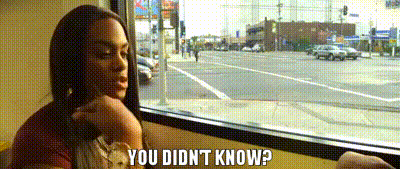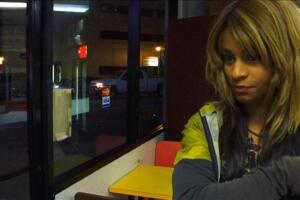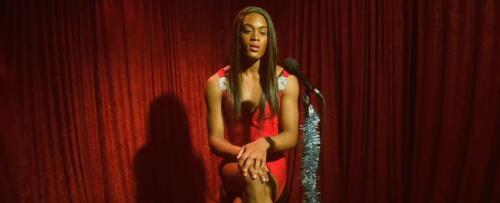Welcome to my first in a series of reviews on SW in Film! As you know, I’m somewhat of a cinephile, so it just made sense to do this. And you are somewhat of a smart-and-hot-women-phile, so… here we are!
The first film for our consideration is Tangerine, directed by Sean Baker. I watched it about a week before writing this, and it was the second film by Baker that I’ve seen, after having seen this year’s (2025) Oscar darling, Anora. I’ve made an effort to watch Tangerine (2015) in as detached a way as I could — I know I don’t know everything, and I’m happy to shift my views in light of new info. And yes, it’s technically a comedy, so I totally understand that some people will want to tell me, “Lighten up! It’s not that serious.” I mean, okay, sure. These are just my thoughts.
Although Tangerine was co-written with Chris Bergoch, I will focus this SW in Film review toward Baker, as he is both the co-writer and the director. Also, disclaimer: I’m not a professional writer or critic, so this article certainly is flawed in terms of writing. Plus, I’m trying to tick my SEO boxes here, so please bear with me as I awkwardly shoehorn in the SEO keyphrase “SW in film” the recommended 15+ times for an article of this length *rolls eyes*. This now being out of the way, go grab your popcorn (or a plump, juicy tangerine) and let’s get critical!

If you’ve never seen much SW in film, I would like to open with a thought exercise: What sort of main character would you imagine? What gender are they, what background do they come from, what are their drives in life? Which genres would best lend themselves to these stories? If you were a director, knowing whatever you happen to know about SW in real life at present, how would you choose to portray this spicy underworld? There are no wrong answers to any of these questions. Just keep on this train of thought, and think about the fact that Sean Baker must have asked himself similar questions when setting out to create film after film about SWers (5 of them, so far). If you happen to think of any other prominent questions in this regard, I invite you to take a moment to tease them out before reading on, and then compare Baker’s treatment with how you might have approached it.
I’m not sure who’s reading this, or what your background is, or whether you’ve ever met any SWers face to face. I think that those who’ve met at least one are likely to view the movie differently than those who haven’t, as they at least have some basis for comparison from which their impressions can stem. The reality is that most adults probably haven’t met any SWers in real life (that they are aware of) and so Baker’s audience is by default going to be completely uninformed about the realities of SW. I would think that in a case like this, where he/she/they are a sort of gateway, some extra care would be taken by a director of SW in film to consider how they may affect society’s perceptions of SWers through their work. Wouldn’t you?
When I’ve seen some non-client civvies (read: non-SWers) respond to coming face to face with a SWer for the first time (that they know of), there’s typically a mix of sheer disbelief, pearl-clutching disdain/disgust, and then… a guilty, sweeping, very natural curiosity that seeps up slowly from the recesses of their repressed sexual imaginations… From these observations, it’s pretty clear to me that the average person isn’t actually able to see SWers as fully human, but rather as objects of a taboo fascination who utterly lack any personal agency. This stereotype, Frankenstein-ed together from bits and bobs of SW in film, TV, novels, rumors, and the seedier side of social media, calls to mind a picture of someone typically desperate and mentally unstable, who has no close family or real friends, who is perpetually broken and doomed to tragic outcomes. Much more tragic a figure than, say, a medical doctor. Weird!

That stereotype is taken to be a priori knowledge by most — they think they don’t need to base their opinions of SW on any sort of experiential knowledge. They just know. (Narrator: They do not, in fact, know anything of the sort). To be fair, if lack of experience disqualifies someone from being able to tell a story about SW without warping it unacceptably, then that means only SWers should be able to tell these stories. However, if that were the consensus, we just wouldn’t have many representations of SW in film – bit of a catch-22.
Many SWers are genuinely happy to get almost any sort of media representation, and from listening to some of their rationales, I understand that it stems from a wish to eventually be integrated and accepted into society, or at the very least for the profession to be decriminalized. I understand this, and I agree to some extent, but we should still hold space for healthy criticism when it comes to art about SW made by people who have never experienced what SWers have. In a nutshell, I don’t believe that all publicity is good publicity when it comes to SW in film.
I guess I should have already mentioned that while Australia, New South Wales, and New Zealand have fully decriminalized SW, and Germany, Netherlands, Switzerland, Belgium, and Nevada in the USA have some sort of partial or planned decriminalization, the USA (except for some counties in Nevada) criminalizes all SWers, and since I live in the USA, and Tangerine takes place here, and Sean Baker is American, we must keep in mind the criminalization and the legal/financial/interpersonal fallout caused by it. All this unpleasant stuff contributes to how SW in film will be received in the USA, and also how it may be received elsewhere with different laws (and different levels of stigma). Just something to keep in mind, when realizing that successful movies do in fact make their mark on the cultures that consume them. And what sort of mark would we like that to be? Life follows art much of the time, after all.
In his interviews, Sean Baker speaks with sensitivity and comes across as confident yet conscientious. He pointedly expresses empathy toward his IRL SWer-actors, and toward the world of SW more generally. He has publicly discussed his artistic choices and in particular his desire to take his subjects seriously enough. He sounds like…a nice guy!…who ostensibly has every intention of doing right by his subjects. His actors seem to really like him, too, from what I’ve read. This does cause me to take a step back, and give him some benefit of the doubt. In other words, I fully recognize that I don’t know this dude, so I’m not qualified to judge Baker as a person.
The heart of my criticism, however, is aimed at Baker, the director. Why do so many of the messages found in Baker’s films often come across as diametrically opposed to his stated intentions? I’ve asked myself many times why this is. His style has, time and time again, been described by actual SWers on Twitter as a “client fantasy.” Is it a blind spot he has, or an intentional two-faced gaslighting of his audience? Or, am I (and others) perhaps feeling unreasonably defensive over a misplaced sense of identification with his characters, which is actually neither very warranted nor particularly accurate (see the following Privilege Disclaimer, in my case)? Whew! I still don’t have an answer to this, but this is the main point I’d like my readers to consider:
It is possible for two things to be true at once. It is possible for Sean Baker to be liked by his cast and for him to truly want to be on the side of SWers (be an ally) when he features SW in film. It is also possible for a director’s personal biases and lack of experiential knowledge to leak into his movies, in effect producing the opposite of some of his conscious intentions.
Privilege Disclaimer: Although I’m an escort, I’m a cis-, white woman whose life experience doesn’t seem to have much overlap with that of the characters of Tangerine. Honestly? I started watching the film with the full intention of reviewing it (partly at my lovely social media followers’ requests), but 30 seconds in, I nearly changed my mind. Reviewing a movie that’s about Black trans women who walk the streets in West Hollywood is something I’m ill-equipped to do, I thought. I still think that. Very little about that situation is recognizable to me. So, I continued watching the movie, thinking I was just going to take in a piece of entertainment, and that would be it.
However, as Tangerine wore on, I realized that while I may not have that particular life experience, I certainly know far more about the experience of dealing with testosterone-flooded clients (and stigma as a sexually-liberated woman) than Sean Baker does. So, here I am, writing this SW in film review, as fraught and problematic as it may be. If anyone who relates more strongly to the characters in Tangerine takes issue with anything I say, I wholeheartedly welcome the criticism and chance to be educated. It is absolutely not my intention to speak for others.
Let’s Peel This Tangerine
SW in Film: Context of Tangerine
Tangerine was released in 2015 right at the cusp of a (relatively) broader acceptance of trans people in American society. This was a time when approval of SW decriminalization was starting to grow noticeably. I’m pretty sure that even the term “SWer” was still pretty new, or at least not as widely-known, in 2015. That made it an opportune time to make a movie like this because “SW” had barely entered the public lexicon, and would pack the punch of novelty for most. Tangerine just barely predates OF and the seismic shift it created in public perceptions of SW. So SW in film, as a topic, was fresher and a lot more mysterious to the public imagination then than it is now.
Baker’s Stated vs. Apparent Intention
Did Baker mean to present this example of SW in film as a titillated client fantasy of the woman-in-trouble, sexual-taboo character trope? Or did he actually intend it as a candid (yet winking) depiction of real SW life? Baker essentially says in interviews that while Tangerine is a work of fiction, it leans realistic. One must admit (it’s clear from watching even just Tangerine and Anora) that Baker has a very specific type of woman that he chooses for his main character. She’s entertainingly feisty and has conventionally pretty/feminine features, but is also cursed with a startling lack of self-awareness that always results in a tragic demise. She is also “ethnic” — that is, from a background which the average White American man may find exotically seductive. She’s sexy even while at the receiving end of violence, in that sort of fierce yet subjugated, wild-eyed animal appeal embodied by film icons Slave Leia and James Bond’s Honey Ryder, and which the infamous photographer Terry Richardson was so crazy about.
Tangerine, like Anora, communicates almost nothing of its characters’ backgrounds, but authoritatively spells out their futures in bright red Hobbesian strokes: “nasty, brutish, and short.” I find it difficult to agree that Baker’s choice of emphasis serves to raise up the SWers who have the worst working conditions. It genuinely comes across to me like he’s mainly out to broadcast his fetishes, despite cloaking them in enough (performative? shall we go there?) sensitive-boy PR talk. Yes, there are men who fetishize “struggling women.” It’s been a thing since forever, as it tickles some men’s desire to feel needed as a protector. And maybe Baker does truly care about the plights of trans, POC SWers, and he believes he’s humanizing them, and maybe even helping them in some indirect way. But Tangerine is really coming across as a client fantasy, where the client wants to rescue the SWer, but he can’t, because collective-she’s inherently self-destructive. This is just wild to me. I get that I’m privileged and some SWers are noticeably self-destructive, but they have reasons. They weren’t born that way. Baker’s movies completely ignore and gloss over this. A far more interesting movie about SWers would be one that explores them fully as the multi-faceted people they are.
The lack of character development and inattention to characters’ backgrounds and inner workings is way too much to overlook and smacks of fetishization. A critic must ask, why does Baker repeatedly embrace the low-hanging fruit of stereotypes, and why does he obscure so much of his characters’ personalities in favor of whatever is most eye-catching and entertaining? After all, it’s eminently possible that someone could simultaneously act in self-serving ways, while sincerely believing that they are helping others. From watching Tangerine and Anora, I would say he has a pretty clear (and not very vindicating) narrative formula for SW in film.
Tangerine and Anora as SW in Film: Narrative Formula
1. His female main character, who we know almost nothing about, goes off the rails spectacularly (to a giddily male adolescent soundtrack of gangsta rap/EDM drops, which is certainly… a choice). I hold Sin-Dee to be the main character in Tangerine despite Alexandra having a similar amount of screen time, since Sin-Dee almost single-handedly propels the plot. She’s hot and – I’ll say it – fairly cis-passing. More about her in the next section.
2. There is always a reserved, semi-likable male character who definitely isn’t Baker’s projection of himself who comes across as flawed yet reasonable, who falls for a SWer, and is arguably the most relatable character. In Tangerine, it’s the taxi driver, Razmik (played by Karren Karagulian). He struggles with his impulses, commitments, and contradictions, but he’s sound of mind, and doesn’t really want to hurt anyone. He is the most relatable main character for the average audience member. (As an aside, I would say that Anora’s analogue to Razmik would be the Russian henchman Igor).

3. The action resembles the antics of a freak show, meant to shock and overpower respectable viewers, while objectifying the performers. Violence and chaos reign supreme. The aesthetic focus is on subversive spectacle, much the same as in Harmony Korine’s movies — the difference being that Korine actually develops his main characters enough for the audience to be able to empathize with them.
4. The moral of the story is that while SW is entertaining, exciting, and infinitely tantalizing, it always results in catastrophic personal ruin for the SWer, and to a lesser degree, anyone entangled with her. For a purported comedy, Tangerine is heavily moralizing.
Again, is it really possible that Baker keeps repeating this flashy and heavily moralistic formula, yet actually is interested in serving up an authentic picture of SW life? Or…does he perhaps have only a surface-level understanding of SW, and simply set out to do what he does best: light up lizard brains (and sell movie tickets) by dressing a provocative topic in pro-wrestling theatrics, with plenty of gratuitous sex to boot?
SW in Film: Character Writing in Tangerine
In Tangerine, there are basically two main characters: the absurdly vengeful Sin-Dee Rella (played by Kitana Kiki Rodriguez), and the more down-to-earth yet pitiful Alexandra (played by Mya Taylor). Rodriguez and Taylor give electrifying performances as trans women who engage in survival SW in their day to day lives in West Hollywood, LA. Fresh out of prison, Sin-Dee is neurotically in love with her emotionally abusive, White, cis-male pimp. Take that in…I mean, really, take that in… She embarks on an hours-long rampage around LA when she hears from Alexandra that said pimp has been cheating on her. That’s the entire plot, folks, sorry for the spoiler.
Alexandra, Sin-Dee’s calmer counterpoint, is the very picture of futility as she unsuccessfully tries to rein in Sin-Dee’s antics, while also trying to be taken seriously as a lackluster singer of maudlin, un-popular cover songs in a dive bar. Throughout the movie, these characters deal out and receive violence, get victimized by nearly every john/customer they meet (as well as by cops), embark on drug-fueled rampages, and…there’s a particularly degrading and heart-breaking scene toward the end, a grand finale of the film’s utter evisceration of its main characters’ egos (again, is this ally-ship, Sean? Just checking). So, you could say there’s a lot to unpack here.
In a Filmmaker Magazine interview, Baker says that the movie “didn’t fictionalize much.” One thing I will applaud is that he hired actual transgender SWers to play his characters. This was, in fact, groundbreaking at the time. And I’m going to believe Baker when he says, with the actresses’ corroboration, that he didn’t fictionalize much. My criticism is directed more at how he cherry-picks character traits (albeit from real life) to suit a certain stereotype and narrative that is limiting and perhaps damaging in terms of what a mainstream audience is likely to glean from it.

The actress who plays Alexandra, Mya Taylor, talks in an Eye for Film interview about loving working with Sean Baker. She describes him as a fatherly figure in terms of his gentle but firm directing style, and notes that she felt very comfortable while working. Truly, I get the impression there was a genuine warmth between Baker and his actors. But, disconcertingly, in the same interview, Taylor also elucidates her personal background and what led her to doing SW in her own life, describing very clear examples of the structural injustices she faced that in her words “forced” her into SW. Where is this commentary in Baker’s movies? I really would have liked to see that at least mentioned in Tangerine, but since there is zero allusion to the characters’ backgrounds (other than Sin-Dee’s prior jail time), one could forgive audiences for assuming that these characters got into SW simply because they were born to be “dumb hos” (there’s that a priori knowledge again – always comes in handy!).
Especially given the prioritization of violence and degradation in Tangerine over any introspective dialogue, why would any audience member stop to question why these characters are in the situations they’re in? And if they don’t ask themselves that, they won’t be in a great position to be able to extend empathy to real life SWers. As a story-teller, I feel Baker should know this. I’m not saying he should go so far as to paint his SWer characters as especially likable or admirable, but he just doesn’t flesh out their detail enough for them to be taken seriously at all. Even I found myself, at the end of the movie, not empathizing much with Sin-Dee in particular because she was just too cartoon-ish, and missing too many key human attributes, for her plight to affect me emotionally.
Another point where Baker shortchanges both his actors and audience: the erasure of Mya Taylor’s musical talent. Taylor also mentions in the (above) interview how, in her real life, she has tried to advance her career as a singer, but has never been taken seriously or given a chance to show her full range. When I read that, I was taken aback by how meta that statement was. As a music lover, it’s clear from the sound of Taylor’s voice in Tangerine that she can really sing, but she’s dimming down her light for the role. And her acting is phenomenal, so it’s evident she could perform with charisma as a musician if given the chance, too. But her character, Alexandra, despite actually having a great voice, manages to meekly sing the most unappealing songs ever, with a sad and pathetic stage presence to boot. It’s clearly meant to be a bad/sad performance. Something for the struggle-fetishists out there. In that way, Tangerine ironically parallels the same slights Taylor has suffered in her real life. No one would know she can really sing, or that she pursues it seriously, unless they just happen to read that interview. Baker, you had one job! Giving a disadvantaged person a platform, only to clip their wings, is not…it.
As with Sin-Dee, we also don’t learn about Alexandra’s background. We only see her faults in the present. Whether it was intentional or not, Taylor’s talents are minimized in her breakthrough role, and the complexity of her life story that led to her being inspiration for her character is completely erased in favor of presenting a character that is simply sad and one-dimensional. Unless audience members read the interview, they might somewhat understandably think that Baker just picked up two random trans women off the street, and paid them to scream and fight a lot on camera. Again, the way things are portrayed, the audience is pretty much left to infer that these characters deserve the problems they have, because the reasons for doing survival SW aren’t discussed, and these characters are easily inferred as having chosen their lifestyles. Leaving such ample room for misunderstanding is an artistic choice, and not one I can get behind.

Rodriguez’ character Sin-Dee is painted in an even worse light than Alexandra. She’s a sort of manic pixie psychopath whose violent temper is the driving force of the film. The only thing we learn about her background is that she’s a violent offender recently out of jail. She is a drug addict who has the reasoning ability of a toddler. Even the film’s soundtrack seems to mock Sin-Dee by cheering on her self-destruction a little too enthusiastically. It sounds like the playlist of a teenage boy who is way too preoccupied with debauchery: clumsily bass-heavy, featuring only the simplest thumping rhythms and raunchiest, belching synth leads. Perhaps if it sounded more in line with trans culture – i.e., had some off-kilter, boppy pop hits, sat more in the treble register, and was more playfully sassy than aggro-androgen-fueled – I could actually believe the soundtrack as that of a movie about trans women. Yes, I said it. Even the soundtrack is male gaze-y, Sean. If it’s supposed to actually represent the male gaze underpinning SWers’ life experience, touché. But if that’s the case, I don’t think that’s presented clearly enough for most men in the audience, and they’ll just end up getting excited by it.
Tangerine‘s Longevity: Fine Wine, or Milk?
I understand that the movie is supposed to be a comedy, but leaning on stereotypes isn’t optimal when representing a heavily oppressed demographic. The average members of Tangerine‘s audience absolutely will take these reinforced stereotypes at face value. I’m guessing that in the long run, Tangerine will age similarly to how Blaxploitation movies have: some nostalgia still remains for them, due to those films having given Black people increased representation. And sure, some people like them for entertainment value. But most people don’t watch them anymore because they’re fundamentally not very thoughtful and reduce Black people to stereotypes. I think that if SWers in the USA ever get equal rights and protections in the future, and are able to be “out” more easily (can easily become film directors and actors themselves), Baker’s oeuvre will age similarly to the Blaxploitation films of yore. Time will tell…
The question of respect really comes down to whether the movie laughs with, or at, SWers. I think most people in the audience feel prompted to laugh at the SWers because the presentation leans that way. Following Anora‘s Oscar wins this year, real SWers were harassed on social media with an unprecedented tidal wave of vitriol. If you search for Twitter posts by major media outlets about Anora’s win, the vast majority of comments disparage SWers. Many people loved the movie, but I didn’t hear many articulate that the movie made them hope for SWers to receive better treatment in real life. The takeaway most people voiced was simply, “How sad for her.” To add insult to injury, Anora has been added to the Criterion Collection (Yes, I’m still reeling, and yes, I can totally laugh at my own preciousness toward the Criterion Collection). In the end, Baker presents violence and stigma against SWers fatalistically, and it seems like his mainstream audience takes it fatalistically, as though the situation just can’t be helped (Narrator: Yes, it can).
In the end, if I could say something to him, I would like to remind Mr. Baker of this:
Life follows art.
And that, dear Reader, concludes my first SW in Film review. Have you seen Tangerine? Let me know whether you agree or not with my thoughts on either my Bluesky or Twitter. If you enjoyed what you read, why not send a little token of your appreciation via my wishlist? Or tell me so in person? You know what to do.
Cinematically yours,
Annie